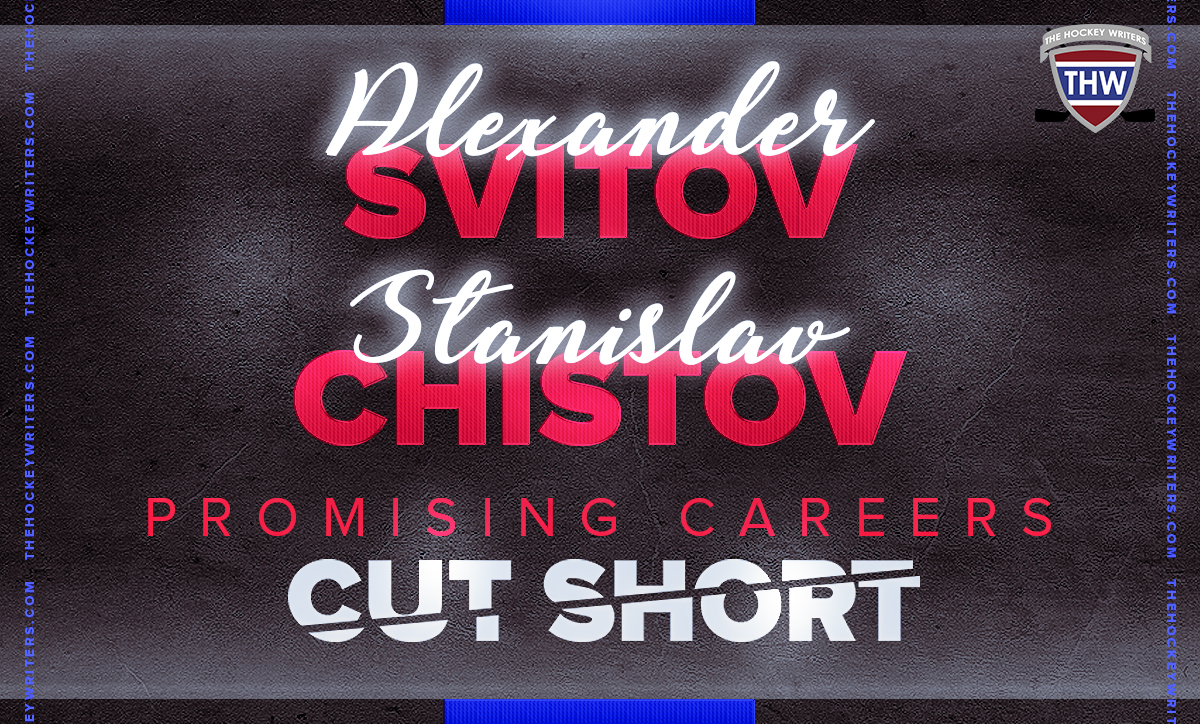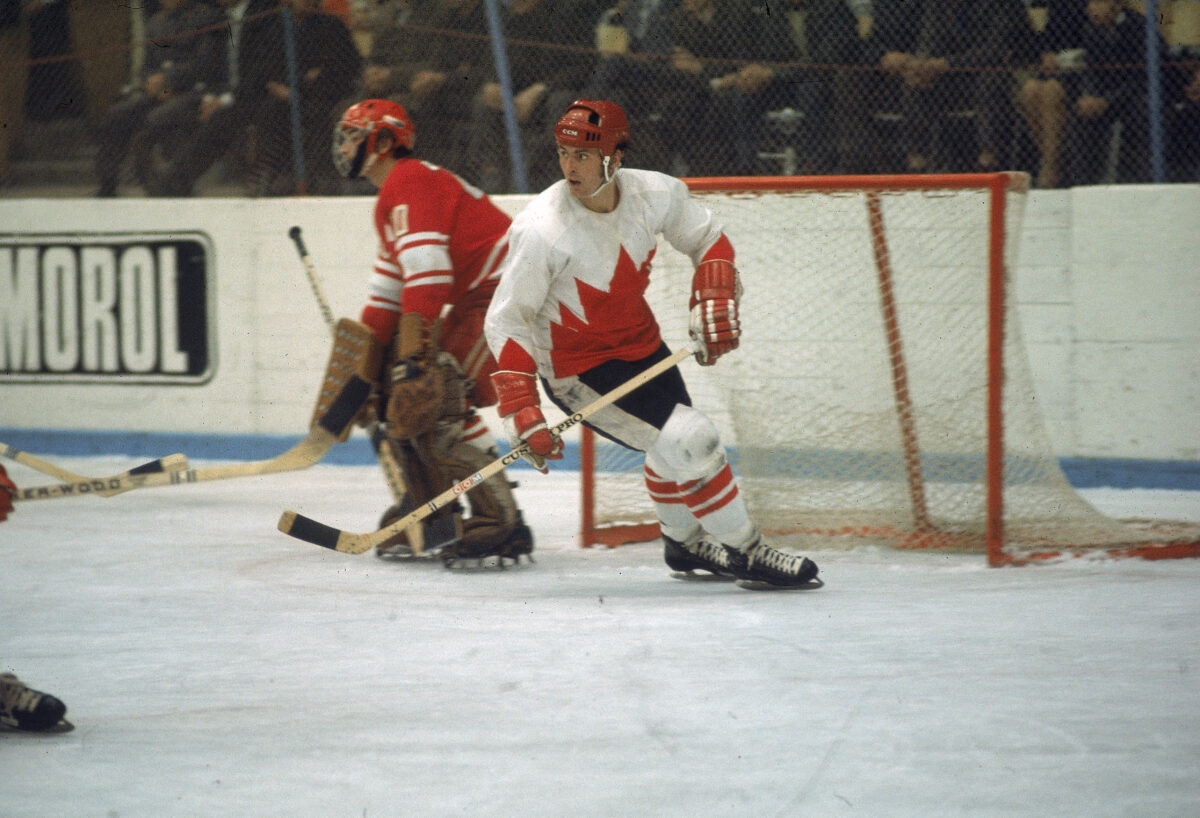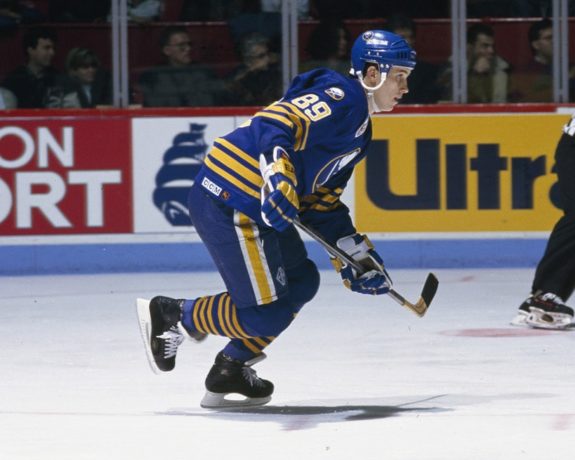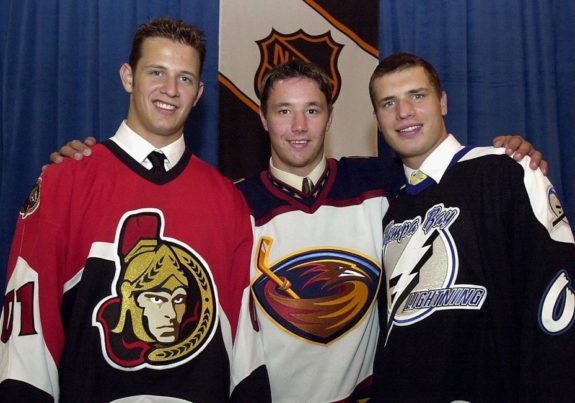When Ivan Fedotov was detained for allegedly attempting to evade military service after signing an entry-level deal with the Philadelphia Flyers in May 2022, it felt more like a story from 1952 and not something from the 21st century. Fans watched with bated breath throughout the 2022-23 season, hoping to see him gain his release from the military, but he never did and the 25-year-old was forcibly kept away from competitive hockey for something he never did. The only update that has been reported is that he is slated to rejoin CSKA in 2023-24, meaning he is unlikely to ever make the trip to Philadelphia.
What seemed like an anomaly paralleled a situation that unfolded, mostly in secret, 20 years ago. In 2001, Alexander Svitov and Stanislav Chistov, two high-profile NHL prospects, were suddenly whisked away from their Russian club and put into the military. When they finally returned to the NHL, they were different players and, unsurprisingly, never lived up to their draft-day hype. Knowing what we know now, it’s clear that these are far from your typical draft busts, but instead, two players who were subject to intense mental stress, both at home and abroad.

So far in this series, I have profiled several players who have struggled through multiple surgeries and concussions until they were physically incapable of playing hockey. But the mental aspect of professional sports is just as important, if not more so, and to have that part shaken so vehemently at a young age can have incredibly detrimental effects. Such were the stories of Svitov and Chistov, who inadvertently exposed the dark underbelly of the Russian sports system to North America and ended up paying the price for it.
Other Promising Careers Cut Short:
The NHL’s History with Russian Players
Although the first European-trained players made their NHL debuts in the 1960s, no Russian-born players appeared in North America until the 1980s. It’s not because the NHL didn’t think they were worth pursuing – the 1972 Summit Series revealed to the world just how talented the Soviets were at that time. The Montreal Canadiens even tried to convince the Soviet authorities to allow Vladislav Tretiak to join their team after selecting him 133rd overall in the 1983 NHL Draft, and it nearly happened in 1984, but at the last minute, the transaction was vetoed.

The Soviets believed that, through domination on the ice, they could show the world the strength of their government and the greatness of Communism. Letting their best players leave for the West would be seen as a weakness, and so very few made the journey. The same could not be said for players from Soviet satellite states, who began risking the little freedom they had to find a new life in North America. Vaclav Nedomansky, a Czech, became the first player to defect to the NHL, leaving his home country in 1974 and first joining the World Hockey Association’s (WHA) Toronto Toros before finding his way to the Detroit Red Wings. In the 1980s, he was joined by Anton, Peter, and Marion Stastny, Petr Klima, Petr Svoboda, and Frantisek Musil, among others.
It wasn’t until 1989 that a Russian defected. Only two Soviets had made their way over to the NHL by then, with Victor Nechayev forfeiting his Soviet citizenship to emigrate in 1982 and Sergei Pryakhin getting permission to leave during the 1988-89 season, although the terms of the deal, unbeknownst to Pryakhin, allowed his paycheque to go directly to the Russian authorities. All that led to Alexander Mogilny deciding to defect at the 1989 World Championship in Sweden. The KGB knew he was a flight risk, but with the help of the Buffalo Sabres, he evaded detection and left the Soviet Union in May, just two months after Pryakhin made his NHL debut.

By then, the Soviets had changed their tune toward the NHL and began allowing certain players to join North American clubs. However, most of them were past their prime. In 1989-90, Mogilny’s rookie season, eight other Russians also made their debut, but he was by far the youngest; Anatoli Semenov, the next youngest, was seven years older than the 20-year-old defector. They were still unbelievably skilled, though, and no one demonstrated that better than Sergei Makarov, the oldest of the bunch at 32, who was awarded the Calder Trophy as the Rookie of the Year that season.
In 1990-91, the Soviets graciously let 21-year-old Sergei Fedorov join the Red Wings, and in 1991-92, 19-year-old Pavel Bure and Slava Kozlov were released. But the USSR’s generosity did nothing to stop the collapse of their nation, and in April 1991, the Soviet Union was no more. That gave NHL teams access to a massive pool of talent and everyone wanted a piece. At the 1991 NHL Draft, the New York Rangers became the first team to use a first-round pick on a Russian, selecting Alexei Kovalev 15th overall, and in 1992, 38 Russians were selected, including six in the first round, making them the second-most drafted nation behind Canada. In less than a decade, Russians made up 25 percent of all Europeans in the NHL and 20 percent of the top scorers. If you wanted to win, you needed a Russian.
Svitov, Chistov & the New Wave of Russians
The 2001 NHL Draft was one for the history books. For the first time in league history, a Russian was selected first overall when the Atlanta Thrashers took Ilya Kovalchuk, the top-ranked European prospect and unanimous favourite. But it was also the first time that three Russians were selected in the first five picks, with the Tampa Lightning taking Svitov third overall and the Anaheim Mighty Ducks taking his teammate, Chistov, with the fifth selection. Never before had a European nation been so widely scouted for talent, and they promised to be franchise cornerstones.
Svitov, a 6-foot-3, 200-pound center, was a punishing power forward and a no-brainer at third overall. In 1998-99, he became the youngest player (16 years and six months) to ever play in the Russian Super League with two playoff appearances for Avangard Omsk. As a 17-year-old, he appeared in 19 Super League games and finished second on Russia’s U18 World Junior team with eight points in six games. But in 2000-01, he showed his true colours as a rugged power forward, putting up 117 penalty minutes in just 39 games. Europeans had been criticized for being soft, but there was no doubt that Svitov was able to handle the grittier North American style and was slated for a bottom-six role with the Lightning in 2001-02.

At just 5-foot-9 and 170-pounds on draft day, Chistov was the complete opposite of his Avangard teammate, but he may have been the most skilled player available. At the 2001 World Juniors, he led the Russians with five goals, outscoring the higher-rated Kovalchuk, and tied for first with six points. When asked about Chistov’s chances at making the NHL, Kovalchuk responded, “It’s not a question of if he makes it, but when. What he draws (on the ice) cannot be erased” (from “From the archives: Habs still trying for No. 1 pick at 2001 draft,” Montreal Gazette – 4/01/2020).
After the draft, the Lightning and Mighty Ducks got to work getting their newest prospects ready for the upcoming season. Svitov flew to Tampa Bay and was immediately offered a three-year, $3.6 million deal, which he happily signed on July 14, although the official statement was kept quiet under the recommendation of his agent, Jay Grossman. Chistov needed to add some muscle and was slated to return to Omsk for a season, but before that, he wanted the Anaheim trainers to look at a knee injury and help him with some rehabilitation, so he was flown out to California for a couple of weeks to help him recover.
Soviet Habits Die Hard
With their NHL orientations complete, Svitov and Chistov returned to Russia where they rejoined Avangard to get their affairs in order for the upcoming season. However, it didn’t take long for their plans to get completely upended. On an Avangard trip to Moscow in early September, the pair, along with teammate and 2002 draft-eligible defenceman Kirill Koltsov, were all seized by Russian military officials in September from their hotel rooms and transferred immediately to CSKA, the army’s official hockey team. The young stars had no idea what was going on; as far as they knew, they didn’t have any connections to the military, but they knew better than to question the Russian army.
“Someone came to my door and told me there were army officers downstairs and they wanted me to go with them. It wasn’t a request.”
Stanislav Chistov (from ‘A Year In, a Year Out,’ Los Angeles Times – 14/01/2002)
News of their abduction trickled into North America through Grossman, their shared agent, who was tasked with getting Svitov ready for the Lightning’s training camp, and it was the confirmation of his worst fears. According to Jay Feaster, Tampa Bay’s general manager at the time, “Grossman expressed concerns that if we announced [Svitov’s contract], as we normally would with any signing, he expressed concern of reprisals against the player and his family in Omsk by the people who run the team” (from “Complicated tussle leaves Svitov waiting in Russia,” Tampa Bay Times – 22/09/2001).
The NHL was immediately suspicious of the circumstances surrounding Svitov and Chistov. According to the International Ice Hockey Federation (IIHF), military obligations are the only thing that can overrule an NHL contract, so the league needed to know the veracity of these claims. Several requests from both the NHL and IIHF were sent to Russia to provide proof, and after a month and a half, they were finally sent photocopies of a military card and other signed documents that stated that the pair enrolled in the military in December 2000, keeping them in Russia for at least two years.
However, there was good reason to doubt the veracity of the documents. Omsk’s president Anatoly Bardin had reportedly bragged to Russian papers about pulling one over on the NHL, leading some to believe that he was the one who enrolled the players into the military to keep his team intact. But when the plan backfired as the players were taken anyways, Bardin was furious, stating, “It’s like it was 30 years ago when they took all the best players and CSKA was a super club.” He began protesting the KHL, which turned into a lengthy court battle to get his players returned to his team.
Related: Draft Busts From the 2000s That Weren’t Busts at All
But Feaster had another theory – money. Normally, the IIHF requires NHL teams to pay a $100,000 transfer fee to Federation members for players signed from European clubs after a specific date. In 2001, that date was July 15, one day after Svitov’s deal. But to secure their release, the NHL ended up paying additional fees directly to Omsk and the Russian Sports Federation. The amounts were never disclosed, but Andrei Zyuzin and Nikita Alexeev, two older Russian prospects, were bought out of the army for $50,000, meaning the total for Svitov and Chistov could have been $300,000, although the total could have been upwards of $500,000 for just Svitov.
Lazy Players and Minor League Demotions
Finally, after nearly a year after being taken from their hotel, Svitov and Chistov were out of Russian control and could move on with their lives in the NHL. It couldn’t have come any sooner, either; during the entire 2001-02 season, Chistov managed to appear in just 16 pro games, while Svitov appeared in just nine, opting to finish his military service with CSKA instead of returning to Avangard once Bardin secured his players’ release. But it sure didn’t hurt Chistov, who scored a goal and three assists in his first appearance with the Mighty Ducks, becoming the youngest player to do so in his very first game. His record stood until Auston Matthews put up a four-goal debut performance in 2016-17.
Expectations were high for the young sniper, but after a blazing start, he began to show signs of lacking confidence. After finishing the first half of his rookie season with 17 points in 37 games, he had just six goals and 13 points in his next 42 games. His struggles continued into 2003-04 and by February, he had been assigned to the American Hockey League (AHL) to help get his confidence back. The young sniper was crushed, but it was hardly a surprise. When asked what he needed to do to get back to playing regular shifts, head coach Mike Babcock bluntly said, “Work…Either you’ve got to earn your ice time or you don’t get to stay” (from “Lupul, Chistov on Different Paths,” Los Angeles Times – 10/12/2003).
It’s hard not to see parallels between Chistov’s first experiences in North America to what he faced in 2001-02. In Anaheim, he was seen as a disappointment and lazy and a move to the AHL’s Cincinnati Mighty Ducks would benefit his development. In Moscow, he was told he was a deserter and that his move to CSKA was to improve his hockey skills, despite the fact the military team was far worse than his home club. But most importantly, he had no say in the matter, and the transfer sure seemed like a punishment despite knowing he didn’t do anything to deserve it.
“I always knew I did nothing wrong, that I did everything by the book. I just wanted to play. But there was a lot of uncertainty, a lot of mental stress. Now, it’s behind me.”
Stanislav Chistov in 2003 talking about his time in the Russian army
Over in Tampa Bay, it was going even worse for Svitov, who was not given the benefit of the doubt thanks to a hot start. By January 2003, he had just two goals and four points in 25 games. His coach, John Tortorella, was also far less forgiving, scratching him on several occasions and playing him less than nine minutes on average in his rookie season. The power struggle continued into the 2003-04 preseason, where Tortorella scratched him for the second time, claiming conditioning as the main reason. “He hasn’t had the start we’d like him to have,” he said. “We want him and feel he has tremendous potential to be an important guy in our lineup, even this year. But it’s a two-way street” (from “Lightning win takes heat off the vets,” Tampa Bay Times – 20/09/2003).
Before the end of the 2003-04 season, during which he’d been loaned to the AHL’s Hamilton Bulldogs, Svitov’s favour ran out in Tampa Bay and he was sent off to the Columbus Blue Jackets for Darryl Sydor. What seemed like a much better situation for the Russian power forward went about the same as his career had gone so far; in 29 games, he scored two goals and eight points. A happy-go-lucky person, the uncertainty of his place in the NHL must have led to increased stress levels that, like Chistov, seemed an awful lot like Russia.
The following season saw both of them forced to return to the AHL due to the NHL Lockout, and neither was offered an extension on their entry-level contracts, so both Svitov and Chistov returned to Russia for the 2005-06 season. They both returned to their respective teams in 2006-07 on short-term deals, but neither was all that impressive, resulting in them returning to Russia for the rest of their careers. Svitov’s departure was especially surprising, as the Blue Jackets were informed that he had signed a three-year deal with Avangard just six weeks after inking a two-year deal with Columbus.
Poor Treatment Gets Poor Results
Svitov and Chistov’s departure left a bitter taste in many fans’ mouths. Some empathized with the coach’s comments regarding their fitness, while others circulated rumours of poor behaviour away from the rink. It’s impossible to verify these stories now, but, thankfully, we have some new information that shines a bit more light on the situation.
The first example is from the pair’s careers after the NHL. While neither became an offensive juggernaut, both were well-respected on their teams and played for at least a decade more in their home country. When they returned home, they were seen as leaders and veterans who could lead a team to a championship, which is exactly what Svitov did – twice. When he retired in 2020, former teammates and coaches had nothing but nice things to say about him.
“[Svitov] was tremendous. He was the team captain, a tremendous competitor, a great leader, very demanding of himself, very demanding of his teammates and tough as hell. This was one big man who was not afraid of anything. There’s no question he belongs back in the NHL.”
Wayne Fleming, Head Coach for Omsk, 2008-09 (from ‘STINT IN RUSSIA HAD A LASTING EFFECT,’ Tampa Bay Times – 25/07/2010).
The second is what we now know about their first NHL coaches. Tortorella is notoriously tough on young players and has repeatedly found himself in minor controversies throughout his career, including publicly benching Pierre-Luc Dubois for flimsy reasons during his tenure with the Blue Jackets. Babcock, on the other hand, was fired after a report surfaced that he drove rookie Mitch Marner to tears through a manipulative motivation strategy while coaching the Toronto Maple Leafs in 2016-17. That kind of behaviour doesn’t come from anywhere, meaning there’s a good chance that he has been doing similar things throughout his career.
Some realities can’t be avoided in professional hockey, such as last-minute demotions and trades. But when young players are treated as commodities, it can have long-lasting detrimental effects on their development. In Russia, Svitov and Chistov were used as political pawns to manipulate the West to pay up. But once in the NHL, they were seen as little more than high picks that weren’t living up to the hype, not as teenagers trying to adjust to a brand new way of life. In the end, the pair returned to the one place they knew would provide them with some stability, even though it was the same place that created the problem in the first place. We’ll never know how many other Russians experienced a similar fate, but the saga of Svitov and Chistov is a somber reminder that these problems never really disappear – they just get harder to spot.